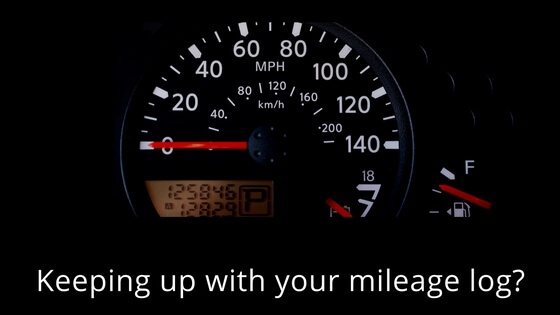Is the mileage rate worth the effort?

If you use your own vehicle for business purposes, you may be able to deduct a percentage of your driving-related expenses from your taxable income. To do so, you’ll need to keep an accurate record of your business-related driving and activities. Many business owners use the mileage rate thinking it is the best option to put money back in their pockets. However, it could be more of a burden and it may not result in more dollars.
Who qualifies to deduct mileage?
The IRS allows employees and self-employed individuals to deduct mileage rate for their vehicles. Currently, the IRS rate is 57.5 cents per mile (2020) for business miles you drive. This applies to you if you are a business owner who travels to and from locations (like a plumber or electrician). Also, it will apply to you when you use your vehicle to drive to the bank, post office or client meeting locations. In fact, businesses that use their vehicle in order to provide their service, like Uber, Lyft, and taxi drivers, also qualify. However, in each instance, you must keep a mileage log.
What are mileage log requirements?
- The date of your trip
- Your starting point
- Your destination
- The purpose of your trip
- Your vehicle’s starting mileage
- Your vehicle’s ending mileage
- Tolls or other trip-related costs
You can keep a mileage log by hand or use software to track your mileage. You can also use a mileage-tracking app. The key, however, is to update your records regularly to ensure that they are accurate. Plus, the IRS requires you to keep your mileage log for three years from the date on which you file the income tax return.
Who does not qualify to deduct mileage?
Like everything with the tax code, there are limitations. So, you must qualify to deduct mileage. You may not deduct the IRS mileage rate if you:
- Drive 5 or more vehicles at the same time in your business
- Claim actual expenses on a lease vehicle (gas, oil, lease payments)
- Are a rural mail carrier who receives reimbursements
- Have already used any depreciation method under the Modified Accelerated Cost Recovery System (MACRS)
- Have already claimed a Section 179 deduction for that vehicle
2020 Mileage Rate
Beginning on January 1, 2208, the standard mileage rates for the use of a car (also vans, pickups or panel trucks) will be 57.5 cents for every mile of business travel driven.
What Paragon does for you
 Paragon accounting and tax will help you determine if it is worth your effort to use the mileage rate for your business miles driven. In order to do that, we need to get to know your business better. Give us a call today and schedule an appointment to talk about your monthly business needs. We specialize in getting big tax saving for small businesses.
Paragon accounting and tax will help you determine if it is worth your effort to use the mileage rate for your business miles driven. In order to do that, we need to get to know your business better. Give us a call today and schedule an appointment to talk about your monthly business needs. We specialize in getting big tax saving for small businesses.
